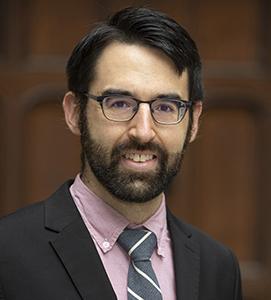William Schultz

William Schultz is our newest faculty member at Divinity. A historian of American religion with an interest in the intersection of religion, politics, and capitalism, Schultz is currently finishing his first book, Jesus in the Rockies: How Colorado Springs Became the Capital of American Evangelicalism (under contract with UNC Press), which explains how the confluence of evangelical Christianity and free-market capitalism transformed the city of Colorado Springs into an epicenter of American conservatism.
Professor Schultz's classes on American religions are open to qualified graduate students and College students. Students can view the schedule to register; see below for more information.
We asked Professor Schultz to answer some important questions.
What are you most looking forward to about life in Chicago?
There’s so many things, but if I had to pick just one ... spending hours wandering around the Art Institute of Chicago.
What are you most looking forward to about joining us at the Divinity School?
The incredibly vast range of interests among the faculty. I’m trained as a historian, so I’m very much looking forward to talking with – and learning from – ethicists, theologians, anthropologists, and literary scholars.
How did you come to do the work you do?
I wrote a paper on religion and the space race in my second year of grad school. While researching it, I came across the story of Jim Irwin, an astronaut who became an evangelical preacher and moved to Colorado Springs. I followed his trail to the Springs and found in that city everything which fascinated me: evangelical Christianity, the military, aerospace, free-market capitalism, and conservative politics. I’ve spent the past few years figuring out why the Springs became so important to evangelicalism, and what that says about American religion.
What are you working on these days?
I’m finishing my book on Colorado Springs and have just started digging into the second project, which will deal with the history of financial fraud within American religion. There’s no shortage of fascinating characters in this story, from gold-prospecting spiritualists to Catholic priests caught up in shady real estate deals.
Opinions on Chicago-style pizza?
I like it, but I’ll need to sample it several hundred more times to reach a conclusion. I’ve applied for several grants to help fund this critically important research.
What do you put on your hot dog?
Nothing. Like UChicago alum Philip Glass, I’m a minimalist.

